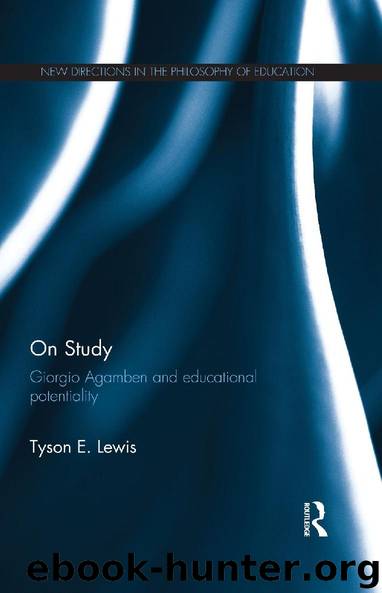On Study: Giorgio Agamben and educational potentiality (New Directions in the Philosophy of Education) by Tyson E. Lewis

Author:Tyson E. Lewis [Lewis, Tyson E.]
Language: eng
Format: epub
ISBN: 9781135087654
Publisher: Taylor and Francis
Published: 2013-06-25T22:00:00+00:00
Ownership is more than the investment in objects in either an economic or a psychoanalytic sense: rather it becomes a springboard for an alchemical transformation of elements that, through the study of the collection, reveals a historical process of production and consumption (precisely the processes that bourgeois ownership conceals or mystifies through fetishization). But whereas the alchemical process of transubstantiation of ownership remains allegorical for Benjamin, I would press him further and suggest that it is precisely study that sets this process in motion.
The connections between collecting and study make these passions so dangerous. Only in relation to study can we fully appreciate Benjamin’s cryptic formulation that the collector is “motivated by dangerous though domesticated passions” (1982: 241). As I have outlined, the passions that motivate the collector are base and highly domesticated. It would appear that nothing of importance separates the passion for ownership found in the collector from the typical bourgeoisie. Yet this passion becomes dangerous when it opens itself up to history through the near distance of study. Study becomes an alchemical process of transformation whereby aura is preserved yet suspended, and where the passion for ownership survives only in the sense that it gives itself over to the passion of study.
Reading Benjamin and Agamben together, I would argue that this aura is what Agamben would refer to as the efficacy of signatures (gleam), or better yet, it is only when the individual aura of the object is profaned (through its removal from traditional ritual and economic exchange) that aura as such shines through. In both cases, aura and efficacy are released through the work of suspension: when signs and things are left idle, then and only then can we study their fate. Like Benjamin’s description of the chaos of his collection—or rather its inherent disorder—so too the collection of signatures is idiosyncratic: a bricolage of traces and fragments that, at first blush, seems to leap and bound without clear reason. Thus collecting and archaeology fall outside the paradigm of modern scientific calculation and delve into a deeper, more mysterious level of aura, passions, and efficacy that crosses disciplinary boundaries, taken-for-granted divisions, and common-sense separations. The systematization of cataloguing and calculation are rejected here for a more intuitive and spontaneous sense of order that is dialectically interrelated to disorder: a zone of “undifferentiated chaos” (Agamben 1999c: 254) that opens a “luminous spiral of the possible” (ibid.: 257) to think beyond the given order of things. Thus for Benjamin and Agamben, the collection is a kind of anti-instrumental, improvisational assemblage that cares for a trace of potentiality (efficacy or aura) left in the residue, separated from signs, and thus exposed, naked and pure for the first time.
The key difference between collecting, as described by Benjamin, and Agamben’s theory of study—or at least his theory as I am elaborating it here— concerns the emphasis on privateness and possession. I would argue that for Benjamin, the work of collecting contains a kernel of subversion precisely because it is a form of private ownership that stands in opposition to public exhibition.
Download
This site does not store any files on its server. We only index and link to content provided by other sites. Please contact the content providers to delete copyright contents if any and email us, we'll remove relevant links or contents immediately.
| Administration | Assessment |
| Educational Psychology | Experimental Methods |
| History | Language Experience Approach |
| Philosophy & Social Aspects | Reform & Policy |
| Research |
The Art of Coaching Workbook by Elena Aguilar(51138)
Trainspotting by Irvine Welsh(21608)
Twilight of the Idols With the Antichrist and Ecce Homo by Friedrich Nietzsche(18602)
Fangirl by Rainbow Rowell(9213)
Periodization Training for Sports by Tudor Bompa(8237)
Change Your Questions, Change Your Life by Marilee Adams(7718)
This Is How You Lose Her by Junot Diaz(6857)
Asking the Right Questions: A Guide to Critical Thinking by M. Neil Browne & Stuart M. Keeley(5741)
Grit by Angela Duckworth(5577)
Red Sparrow by Jason Matthews(5450)
Paper Towns by Green John(5163)
Room 212 by Kate Stewart(5091)
Ken Follett - World without end by Ken Follett(4705)
Housekeeping by Marilynne Robinson(4420)
The Sports Rules Book by Human Kinetics(4367)
Double Down (Diary of a Wimpy Kid Book 11) by Jeff Kinney(4252)
Papillon (English) by Henri Charrière(4238)
The Motorcycle Diaries by Ernesto Che Guevara(4069)
Exercise Technique Manual for Resistance Training by National Strength & Conditioning Association(4048)
